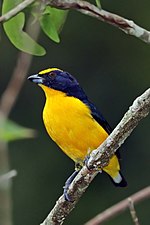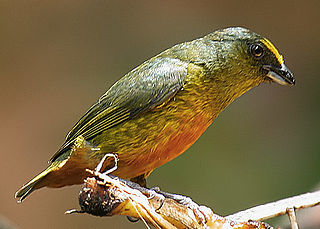
The olive-backed euphonia is a small passerine bird in the finch family. It is a resident breeder in the Caribbean lowlands and foothills from southern Mexico to western Panama.

The golden grosbeak, also known as golden-bellied grosbeak or southern yellow grosbeak, is a species of grosbeak in the family Cardinalidae. It is similar to, and has sometimes been considered conspecific with, the yellow grosbeak.

The mountain kingfisher is a species of bird in the subfamily Halcyoninae in the family Alcedinidae. Adult males are 21–24 cm (8.3–9.4 in) long, and have a rufous head and underparts, greenish-blue upperparts, a dark blue tail, and black flight feathers. They also have dark neck patches and loral patches. Females have dark crowns and the neck patches join at the nape. It is similar to the yellow-billed kingfisher, but can be distinguished by its larger size and a proportionally larger bill, along with a dark ridge along its culmen.

The yellow-billed cacique is a species of cacique in the family Icteridae. It belongs to the monotypic genus Amblycercus. There is some question as to whether or not it is a true cacique.
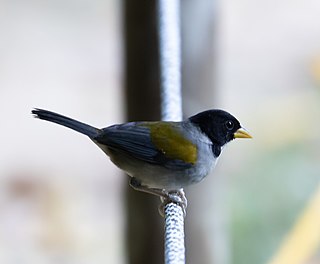
The Golden-winged sparrow is a species of bird in the family Passerellidae that can found in Colombia and Venezuela. Its natural habitats are subtropical or tropical dry forests and subtropical or tropical dry shrubland.

The golden-browed chlorophonia is a species of bird in the family Fringillidae. It is found in Costa Rica and Panama. It is uncommon in subtropical or tropical moist montane forest above 750 m (2,460 ft) elevation.

The black-chested jay is a species of bird in the family Corvidae.
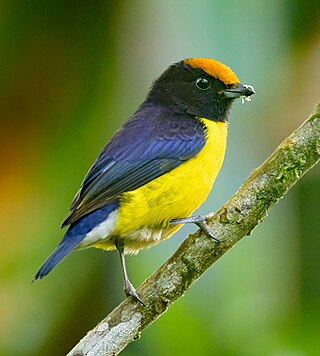
The tawny-capped euphonia is a species of bird in the family Fringillidae. It is found in Colombia, Costa Rica, and Panama. Its natural habitats are subtropical or tropical moist lowland forest, subtropical or tropical moist montane forest, and heavily degraded former forest.
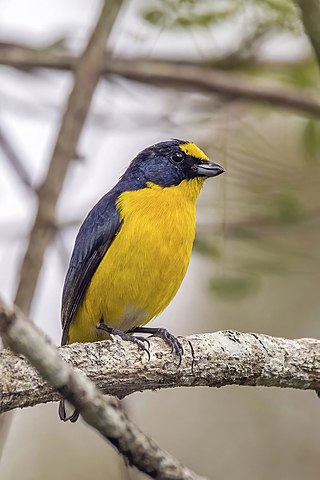
The yellow-throated euphonia is a species of songbird in the family Fringillidae. It is found in southeastern Mexico and throughout Central America with its range stretching from Belize south to western Panama. It inhabits primarily both humid and dry regions where it prefers the forest edge, open woodland, and shaded plantations. It has two subspecies, the nominate subspecies Euphonia hirundinaceahirundinacea and Euphonia hirundinacea gnatho. This finch is a small bird with pointed wings and a short bill and short tail. Males of this species have dark glossy blue-black upperparts excluding a yellow forecrown, and bright yellow underparts, while females have olive green upperparts and whitish-gray breast and lower parts. It has a shrill song that alternates between high-pitched and moderately pitched and appears to be able to mimic some calls of other birds.

The yellow-crowned euphonia is a species of bird in the family Fringillidae. It is found in Costa Rica, Nicaragua, and Panama, and is perhaps the most common euphonia in its range. Its natural habitats are subtropical or tropical dry forest, subtropical or tropical moist lowland forest, and heavily degraded former forest. It can be found on occasion in the canopy of small forests.

The Trinidad euphonia is a species of bird in the family Fringillidae. It is common in northern Colombia and northern Venezuela and uncommon to rare on the Caribbean island of Trinidad. Like all euphonias, it is small, stocky, and short-tailed; unlike some, it is sexually dimorphic. The male is glossy blue-black on the head, back, throat, and upper breast, with a bright yellow forehead and crown, and bright yellow underparts. The female is olive-green above and yellow-olive below, with a grayer patch running down the center of her breast and abdomen, and bright yellow undertail coverts. Its calls are high-pitched, plaintive whistles: the two most common are a single-pitched, double-noted "pee pee" or "tee dee", or a rising, double-noted "puwee", "cooleee" or "duu dee". Its song is a short, jumbled mix of musical and nonmusical notes.
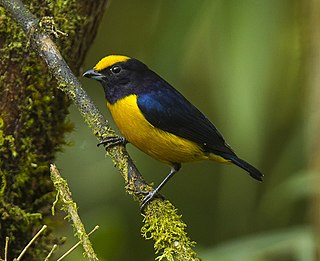
The orange-bellied euphonia is a species of bird in the finch family, Fringillidae. They were formerly considered tanagers (Thraupidae). It is found in Bolivia, Brazil, Colombia, Ecuador, Guyana, Panama, Peru, and Venezuela. Its natural habitats are subtropical or tropical moist lowland forest and subtropical or tropical moist montane forest.

The sulphur-rumped myiobius or sulphur-rumped flycatcher is a species of passerine bird in the family Tityridae. It is found in Belize, Colombia, Costa Rica, Ecuador, Guatemala, Honduras, Mexico, Nicaragua, and Panama. Its natural habitat is subtropical or tropical moist lowland forests.

The tawny-breasted myiobius or tawny-breasted flycatcher is a species of passerine bird in the family Tityridae. It is found in Bolivia, Colombia, Ecuador, Panama, Peru, and Venezuela. Its natural habitat is subtropical or tropical moist montane forests.

The thick-billed seed finch is a species of bird in the family Thraupidae, but was until recently placed in Emberizidae. It is found widely in shrubby and grassy areas from southern Mexico, through Central America, to the Chocó in Colombia and Ecuador. It is replaced by the closely related chestnut-bellied seed finch in South America east of the Andes, as well as the valleys of Cauca and Magdalena in Colombia. The two have often been considered conspecific as the lesser seed-finch.

The red-capped manakin is a species of bird in the family Pipridae. It is found in Belize, Colombia, Costa Rica, Ecuador, Guatemala, Honduras, Mexico, Nicaragua, Peru and Panama. Its natural habitat is subtropical or tropical moist lowland forest.

The black oropendola is a species of bird in the family Icteridae. It is found in Colombia and Panama. Its natural habitat is subtropical or tropical moist lowland forests.

The purple-throated fruitcrow is a species of bird in the family Cotingidae, the cotingas. It is the only species of the genus Querula. It is native to Nicaragua, Costa Rica, Panama, and most of the northern half of South America, its habitat being humid lowland forest where it feeds mainly on insects and fruit. It is a glossy black, medium-sized bird and the male has a purple-red throat patch. It nests in close vicinity with other birds of its species. Its population is in decline, but it is a common species with a very wide range, and the International Union for Conservation of Nature has assessed its conservation status as being of "least concern".
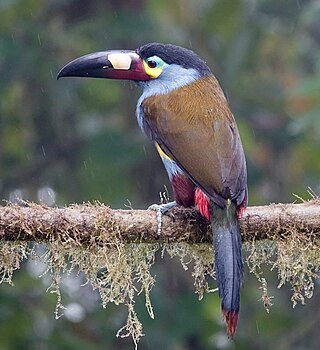
The plate-billed mountain toucan is a species of bird in the family Ramphastidae. It is native to the west slope of Ecuador and extreme southern Colombia, where it lives in the high-altitude humid mountain forests of the Andes.

The yellow-eared toucanet is a near-passerine bird in the toucan family Ramphastidae. It is found from Honduras to Ecuador.






